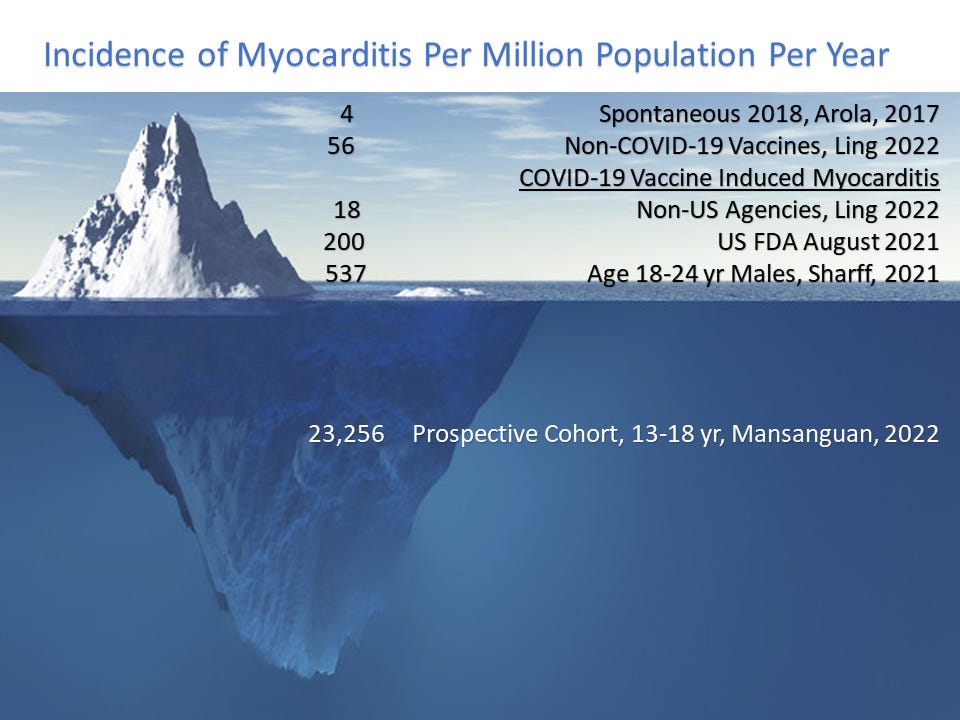(Courageous Discourse) – In 2021 the U.S. Centers for Disease Control and Prevention (CDC) and Food and Drug Administration (FDA) warned America and the world that the mRNA COVID-19 vaccines could result in heart inflammation or myocarditis.
This is a medical problem that has occurred in the past not related to vaccines but at a low rate of approximately 4 per million population per year as reported by Arola, et al, from Finland. In general, approximately 90 percent of cases occur in men and around 10 percent in women. The principles of management include stopping all forms of exercise, since that can be a driver of the development of heart failure and a trigger for sudden death. In cases where there is a progression to heart failure, cardiac biopsy is commonly performed to establish or rule out a diagnosis of giant cell myocarditis which has a markedly worse prognosis than the other forms (parvovirus, etc).
COVID-19 vaccination has been thrust on the world with such vehemence that there has been a hesitancy among physicians and hospitals to spontaneously report cases to the regulatory agencies. The vast majority of physicians took COVID-19 vaccines themselves and may be having trouble coming to personal grips with the threat of heart damage and other risks of vaccination.
In 2021, as spontaneous reports came into agencies showing young men predominantly were developing myocarditis with COVID-19 vaccination, a pattern emerged:
1) The highest risk group was males aged 18–24, with a skewed distribution and a long tail that extended to men in their seventies.
2) Around 90 percent of cases required hospitalization.
3) The risk of developing the condition was explosive after the second injection.
4) Death directly due to myocarditis was confirmed by autopsy.
In the biological licensing agreement letters to Pfizer and Moderna, the FDA requested prospective cohort studies of myocarditis which call for measurement of blood tests, ECG, and cardiac imaging before injections and at timepoints afterwards to detect the real rate of heart damage and to ascertain how much of the problem could be asymptomatic and potentially present a future risk of sudden death in an unsuspecting patient. Both companies were not forthcoming, so the answer came from Mansanguan et al, from the Bhumibol Adulyadej Hospital, Bangkok, Thailand.
Adolescents aged 13–18 were studied in a prospective cohort manner just after the second injection of the Pfizer vaccine and 7/301 (23,256/million) developed myocarditis using a clinical definition based on blood tests, ECG, and cardiac imaging. Data from multiple sources suggest the condition can be subclinical in about half, meaning neither the patient nor the parents bring it to clinical attention.
Patone et al have recently reported on 100 fatal cases of vaccine-induced myocarditis in the U.K., and such papers are expected to continue with larger numbers as the medical community begins to fully recognize cause and effect. Thus, spontaneous reporting to agencies represents the tip of a very large iceberg.

If the estimate Mansanguan study is confirmed or anywhere close to the approximately 25,000/million finding, that means a million young Americans could have sustained heart damage from COVID-19 vaccination and some of them will be at risk for cardiac arrest and future heart failure. These data suggest we should not be surprised by rising rates of sudden death in young persons with sports and during daily life including sleep.
There can be no more urgent need to halt vaccination and commit a substantial research effort into screening, detection, prognosis, and management of COVID-19 vaccine induced myocarditis. The stakes are high — an entire generation is at risk.
Reprinted with permission from Courageous Discourse.

